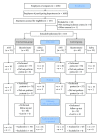Evaluation of a seven-week web-based happiness training to improve psychological well-being, reduce stress, and enhance mindfulness and flourishing: a randomized controlled occupational health study
- PMID: 24489588
- PMCID: PMC3893772
- DOI: 10.1155/2013/676953
Evaluation of a seven-week web-based happiness training to improve psychological well-being, reduce stress, and enhance mindfulness and flourishing: a randomized controlled occupational health study
Abstract
Background. As distress in society increases, including work environments, individual capacities to compete with stress have to be strengthened. Objective. We examined the impact of a web-based happiness training on psychological and physiological parameters, by self-report and objective means, in an occupational health setting. Methods. Randomized controlled trial with 147 employees. Participants were divided into intervention (happiness training) and control groups (waiting list). The intervention consisted of a seven-week online training. Questionnaires were administered before, after, and four weeks after training. The following scales were included: VAS (happiness and satisfaction), WHO-5 Well-being Index, Stress Warning Signals, Freiburg Mindfulness Inventory, Recovery Experience Questionnaire, and Flourishing Scale. Subgroup samples for saliva cortisol and alpha-amylase determinations were taken, indicating stress, and Attention Network Testing for effects on attention regulation. Results. Happiness (P = 0.000; d = 0.93), satisfaction (P = 0.000; d = 1.17), and quality of life (P = 0.000; d = 1.06) improved; perceived stress was reduced (P = 0.003; d = 0.64); mindfulness (P = 0.006; d = 0.62), flourishing (P = 0.002; d = 0.63), and recovery experience (P = 0.030; d = 0.42) also increased significantly. No significant differences in the Attention Network Tests and saliva results occurred (intergroup), except for one saliva value. Conclusions. The web-based training can be a useful tool for stabilizing health/psychological well-being and work/life balance.
References
-
- Seligman ME, Csikszentmihalyi M. Positive psychology: an introduction. The American psychologist. 2000;55(1):5–14. - PubMed
-
- Veenhoven R. World database of happiness: tool for dealing with the ‘data-deluge’. Psychological Topics. 2009;(18):221–246.
-
- Esch T. Gesund im Stress: Der Wandel des Stresskonzeptes und seine Bedeutung für Prävention, Gesundheit und Lebensstil. Gesundheitswesen. 2002;64(2):73–81. - PubMed
-
- Esch T, Stefano GB, Fricchione GL, Benson H. Stress in cardiovascular diseases. Medical Science Monitor. 2002;8(5):RA93–RA101. - PubMed
-
- Stefano GB, Benson H, Fricchione GL, Esch T, editors. The Stress Response: Always Good and When It Is Bad. New York, NY, USA: Medical Science International; 2005.
LinkOut - more resources
Full Text Sources
Other Literature Sources
Research Materials


